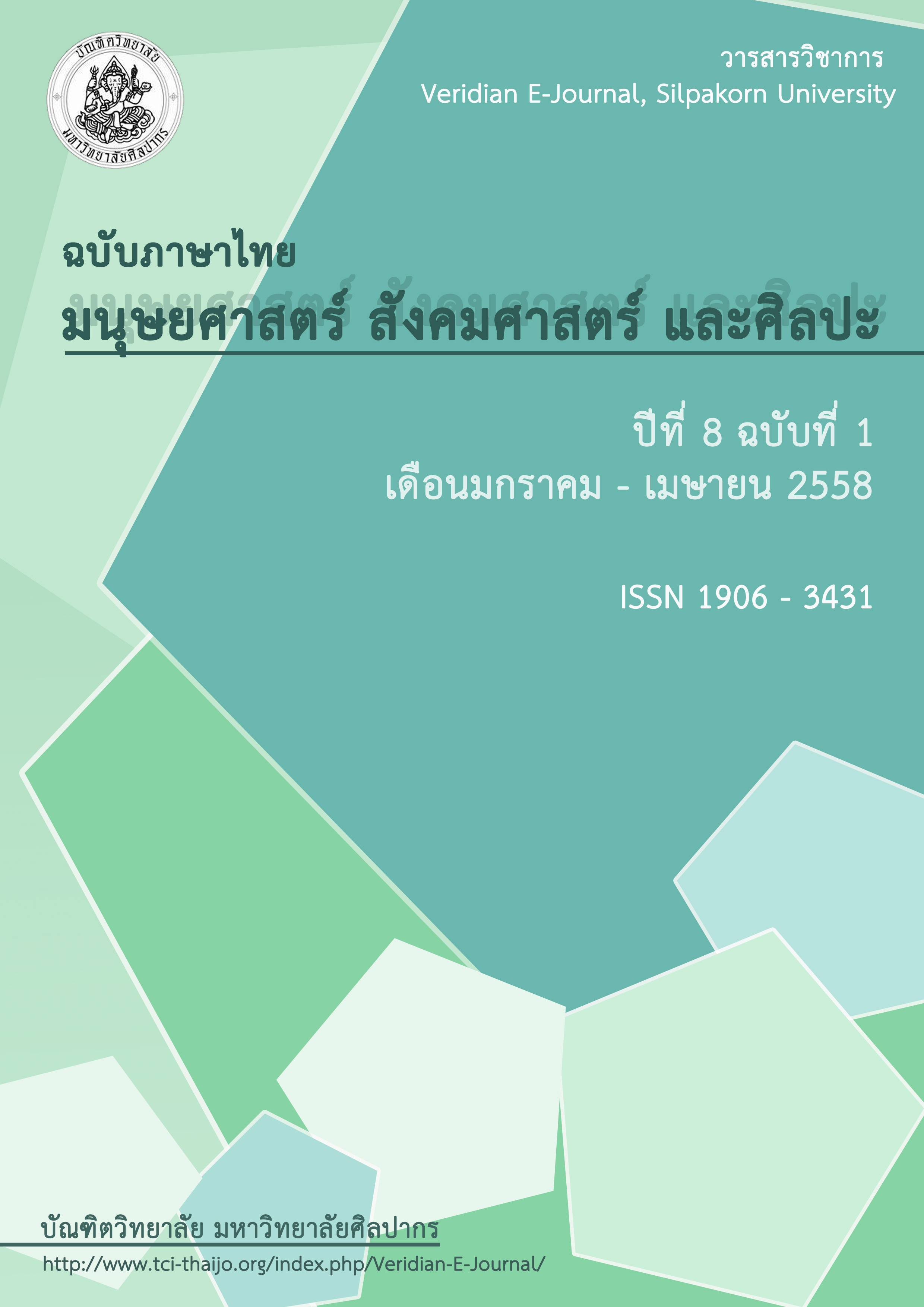การวิเคราะห์องค์ประกอบภาวะผู้นำการเปลี่ยนแปลงของผู้บริหารมหาวิทยาลัยราชภัฏ ที่มีผลต่อประสิทธิผลการบริหารมหาวิทยาลัย
Main Article Content
Abstract
บทคัดย่อ
การศึกษาวิจัยครั้งนี้มีวัตถุประสงค์ มีวัตถุประสงค์ (1) เพื่อวิเคราะห์องค์ประกอบภาวะผู้นำการเปลี่ยนแปลงของผู้บริหารมหาวิทยาลัยราชภัฏ (2) เพื่อศึกษาประสิทธิผลการบริหารมหาวิทยาลัยราชภัฏ และ (3) เพื่อศึกษาองค์ประกอบภาวะผู้นำการเปลี่ยนแปลงของผู้บริหารที่มีผลต่อประสิทธิผลการบริหารมหาวิทยาลัยราชภัฏ โดยใช้แบบสอบถามที่มีค่าความเชื่อมั่น 0.99 เป็นเครื่องมือในการเก็บรวบรวมข้อมูลจากกลุ่มตัวอย่างจำนวน 351 คน ได้รับข้อมูลที่สมบูรณ์จำนวน 287 คน คิดเป็นร้อยละ 81.76 วิเคราะห์ข้อมูลโดยใช้ ค่าความถี่ ค่าร้อยละ ส่วนเบี่ยงเบนมาตรฐาน การวิเคราะห์องค์ประกอบ และการวิเคราะห์การถดถอยพหุคูณแบบขั้นตอน ผลการวิจัยพบว่า
- องค์ประกอบภาวะผู้นำการเปลี่ยนแปลงของผู้บริหารมหาวิทยาลัยราชภัฏ แยกเป็น 3 องค์ประกอบได้แก่ การบริหารการเปลี่ยนแปลง การกระตุ้นให้เกิดการเปลี่ยนแปลง และการมีอิทธิพลต่อผู้ร่วมงาน
- ประสิทธิผลการบริหารมหาวิทยาลัยราชภัฏโดยรวมและรายด้านอยู่ในระดับมากเกือบทุกด้าน ยกเว้นด้านความมีเสถียรภาพของบุคลากร อยู่ในระดับปานกลาง โดยด้านเทคโนโลยีในมหาวิทยาลัย มีค่าเฉลี่ยมากที่สุด ส่วนด้านความมีเสถียรภาพของบุคลากรมีค่าเฉลี่ยน้อยที่สุด
3. องค์ประกอบภาวะผู้นำการเปลี่ยนแปลงของผู้บริหารที่มีผลต่อประสิทธิผลการบริหารมหาวิทยาลัยราชภัฏ ประกอบด้วย การบริหารการเปลี่ยนแปลง(X1) การกระตุ้นให้เกิดการเปลี่ยนแปลง(X2) และการมีอิทธิพลต่อผู้ร่วมงาน (X3) ซึ่งสามารถพยากรณ์ถึงประสิทธิผลการบริหารมหาวิทยาลัยราชภัฏ ได้ร้อยละ 76.20
สมการพยากรณ์ ได้แก่
3.1 สมการพยากรณ์ในรูปของคะแนนดิบ
Y = a + B1X1 + B2X2+ B3X3
= 0.646 + 0.289 X1 + 0.278 X2 + 0.252X3
3.2 สมการถดถอยในรูปคะแนนมาตรฐาน คือ
Z = β1Z1+ β2Z2 + β3Z3
= 0.314 Z1+ 0.295Z2 + 0.300 Z3
คำสำคัญ : ภาวะผู้นำการเปลี่ยนแปลง, การวิเคราะห์องค์ประกอบ, ประสิทธิผลการบริหารมหาวิทยาลัย
Abstract
The purpose of this research was: 1) to analyze the transformational leadership’ s factors of Rajabhat University’s administrators 2) to study the level of Rajabhat University’s administrative efficiency; and 3) to study the transformational leadership’ s factors of Rajabhat University’s administrators affecting the University’s administrative efficiency. 351 questionnaires which were 0.99 reliability were sent out. 287(81.76 percentage) were completed to be analyzed. The data was analyzed using frequency, percentage, mean, standard deviation, factor analysis and stepwise multiple regression analysis.
The research findings were as follows:
1. The transformational leadership’ s factors of Rajabhat University’s administrators were analyzed to be 3 factors :the change management, the change stimulation, and the individual influence.
2. The level of Rajabhat University’s administrative efficiency was at the high level, except the personnel stability was at the moderate level. The mean of University’s technology was highest level whereas the mean of the personnel stability was the least.
3. The transformational leadership’ s factors of Rajabhat University’s administrators affecting the University’s administrative efficiency were the change management (X1), the change stimulation(X2), and the individual influence(X3) respectively which predicted to Rajabhat University’s administrative efficiency at 76.20 percentage.
The regression equation or predicting equation in raw scores was the following:
Y = 0.646 + 0.289 X1 + 0.278 X2 + 0.252 X3
The regression equation in standard scores was the following:
Z = 0.314 Z1 + 0.295 Z2 + 0.300 Z3
Keyword(s) : Transformational Leadership, Factors Analysis, Administrative Efficiency.
